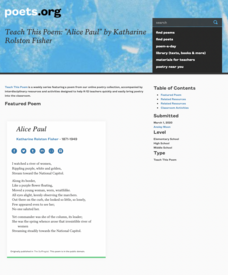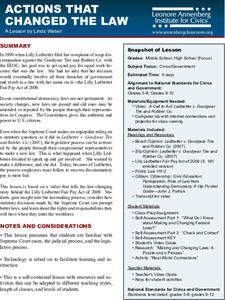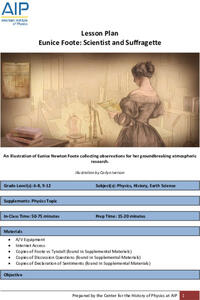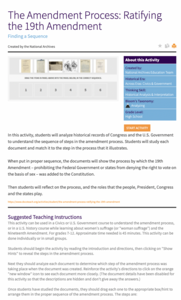Academy of American Poets
Teach This Poem: "When Fannie Lou Hamer Said" by Mahogany L. Browne
After watching an excerpt from a video of Fannie Lou Hamer's testimony before Congress, pupils do a close reading of Mahogany L. Browne's poem "When Fannie Lou Hamer Said," annotate words and phrases that draw their attention and list...
Academy of American Poets
Teach This Poem: "Alice Paul" by Katharine Rolston Fisher
Powerful women need not look like Wonder Woman. After writing a paragraph about a strong woman they know, young scholars examine images of Alice Paul and then do a close reading of Katharine Rolston Fisher's poem "Alice Paul." Finally,...
National Endowment for the Humanities
“The Great Migration” by Minnie Bruce Pratt
Minnie Bruce Pratt's poem, "The Great Migration," offers young scholars an opportunity to reflect on how where we come from influences who we are. Groups conduct a close reading of the poem, recording observations about the poem's...
National Endowment for the Humanities
“Every Day We Get More Illegal” by Juan Felipe Herrera
A study of Jan Felipe Herrera's poem "Every Day We Get More Illegal" opens the door for a discussion on immigration. To begin, class members examine the photograph "Desert Survival," record their observations of the image, and then...
Memorial Hall Museum
Dedham Deed
Class members examine primary source documents that expose the contrasting views of land ownership between the Pocumtuck and English settlers.
National Endowment for the Humanities
Harriet Jacobs and Elizabeth Keckly: The Material and Emotional Realities of Childhood in Slavery
Young historians learn how to make generalizations based on primary sources in a instructional activity that uses the autobiographies of two women born into slavery. The class watches a historical re-enactment of scenes from the lives of...
Annenberg Foundation
Actions that Changed the Law
The Fair Play Act of 2009 came about due to the actions of one woman. Young historians research Lilly Ledbetter and what she went through to get pay equal to that paid to men for the same work at Goodyear Tire and Rubber Company. The...
K20 LEARN
Identity Theft: Don't Let This Happen to Your Grandma!
Class members consider how people steal online identities as they discover the essential elements of identity theft and consumer fraud. Pupils demonstrate learning by creating a poster or video about how to avoid identity theft.
Smithsonian Institution
The Suffragist: Educator's Guide for Classroom Video
Class members take on the role of historical investigators to determine why it took 40 years for women in the United States to get the right to vote. Sleuths view videos and analyze primary sources and images to gather evidence to answer...
National Endowment for the Humanities
Harriet Tubman and the Underground Railroad
While many have heard of Harriet Tubman, few are aware of the many ways this remarkable woman was involved in the United States Civil War, the abolitionist movement, and the Underground Railroad. Young historians examine primary source...
National Endowment for the Humanities
African-American Communities in the North Before the Civil War
Middle schoolers may be surprised to learn that before the American Civil War there were more slaves living in New York than there were in Kentucky! Young historians examine maps and census data to gather statistics about...
Learning for Justice
Marian Wright Edelman
Marian Wright Edelman's 2014 Commencement Speech at Lewis and Clark College serves to inspire young scholars to investigate a problem in their community, to determine why the problem is important, and then to develop a plan for one thing...
Learning for Justice
Mary McLeod Bethune
Young historians conduct a close reading of the text of an interview with Mary McLeod Bethune, the daughter of former slaves who taught herself to read, grew up to establish schools for other Black women, and went on to become an advisor...
Anti-Defamation League
Student Dress Codes: What's Fair?
The controversy over school dress codes continues. The debate involves questions like, why is there a policy? Who sets the policy? Who enforces the policy? What is a fair policy? Tweens and teens have an opportunity to engage in the...
Anti-Defamation League
Is Olympic Coverage Sexist?
Women Olympians have come a long way since 1900 when 22 women competed for the first time. News coverage of the Olympics has also changed dramatically. What has been slow to change, however, is the language used in the coverage of female...
Anti-Defamation League
Soccer, Salaries and Sexism
Call it soccer, call it football, but call it unfair! the US women's soccer team has called out the US Soccer Federation for unfair treatment in terms of salaries, support, and working conditions in a lawsuit filed in 2019. Young...
Learning for Justice
Mary Church Terrell
Excerpts from an 1898 speech by civil rights activist Mary Church Terrell offers young scholars an opportunity to investigate how Black American women fought for civil rights long before Rosa Parks and the civil rights movement of the...
Learning for Justice
Maya Angelou
Maya Angelou's poem, "Still I Rise", offers young scholars an opportunity to consider how poets use literary devices to create powerful messages. After a close reading and discussion of the poem, class members reflect on how they can...
US National Archives
Susan B. Anthony and the Struggle for Suffrage
Susan B. Anthony was willing to break the law to gain voting rights for women. Young historians investigate Anthony's willingness to go to jail to draw attention to the suffrage movement. They read and discuss primary source documents to...
Teaching Women's History
Medieval Women
Not all the women in the late Middle Ages (1400-1510) lived lives of quiet desperation. Young historians study images and read primary source documents to gain an understanding of what life was like for the elite class of medieval women.
American Institute of Physics
Eunice Foote: Scientist and Suffragette
The greenhouse effect and climate change are hot topics in today's news. Young scientists may be surprised to learn that the concept is not a new one. In fact, Eunice Newton Foote, scientist, inventor, and suffragette, discovered the...
Anti-Defamation League
Who is Malala Yousafzai?
Malala Yousafzai may be young, but she's mighty! Young scholars listen to a short lecture about Malala's background, read an article about her winning the Novel Peace Prize, and meet in groups to discuss statements she has made. Class...
Anti-Defamation League
Harriet Tubman on the $20 Bill: The Power of Symbols
How important are symbols and symbolic gestures in society? Middle schoolers have an opportunity to analyze the importance of symbols on American currency with a lesson that investigates the controversies surrounding redesigning the $5,...
DocsTeach
The Amendment Process: Ratifying the 19th Amendment
The process for adding an amendment to the U.S. Constitution is long and arduous, by design. High School historians study a series of documents about the Nineteenth Amendment and, using an interactive program, drag the documents onto a...

























